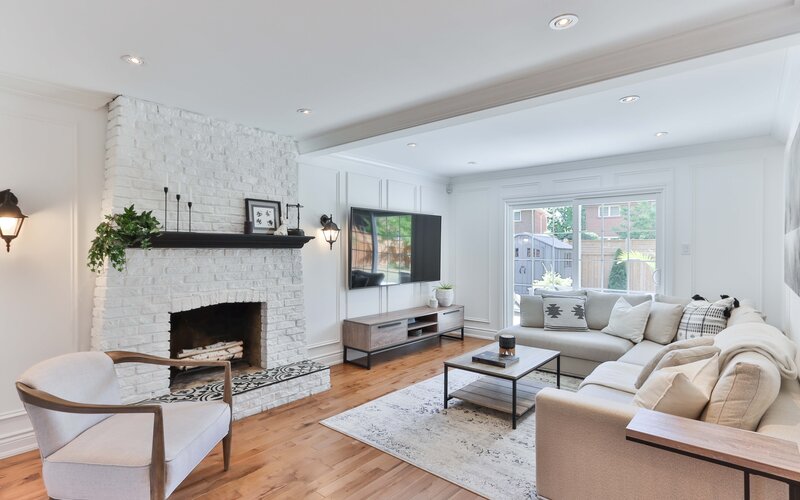The property boom has been a hot topic of conversation over the past year, with national house prices exploding by almost 22% over the past 12 months according to Domain.
This is why it's 'no surprise' many Australians have had a number of 'property blunders' over the past year according to Lloyd Edge, Director of Aus Property Professionals (pictured above).
To go into the new year knowing what to avoid, Mr Edge provided the five most common mistakes property buyers made this year.
1. Capital cities over regional
Many Aussies flocked to the regions over the course of the pandemic - either seeking a scenic change or to escape lockdowns - but there hasn't been the same level of regional activity in 2021.
Mr Edge believes many have gone back to the age-old belief that you must buy in large city centres.
"Although a 'sea change' may no longer be relevant to your personal circumstances, for example you are now physically required in the office, you can still consider these areas for an affordable investment opportunity, instead of sinking the majority of your money into a smaller place in a capital city," Mr Edge said.
"If you are looking to do this, look for national parks or undervalued beaches that are located in affordable capital areas."
2. Following the herd
"If you invest where everyone else does, you will see mediocre results," Mr Edge said.
He said that if you're hearing about an investment opportunity, it's 'probably too late'.
"Your own individual strategy and goals are so important in property investment, so make sure you don’t just follow what your friends or neighbours are doing," Mr Edge said.
"Evaluate your life and understand what you really want – is it a bigger backyard, a study, a balcony, proximity to cafes and restaurants? The pandemic has forced many people to realise what they truly want in their life and property."
He also stressed the importance of doing your due diligence, looking at the facts and statistics available to you.
"Some fantastic resources include CoreLogic, Australian Bureau of Statistics, Real Estate Investar, SQM Research," Mr Edge said.
"This allows you to take control of your own strategy, instead of relying on the ‘trend’."
3. Waiting on the market
At the start of the pandemic, many experts predicted a major housing market crash.
"Some economists predicted a mammoth 40% crash," Mr Edge said.
"As you know, this certainly didn’t happen, with the ABS stating that residential property prices rose 6.7% in the June quarter 2021, the strongest quarterly growth since they began recording in 2003."
Mr Lloyd described the Australian property market as 'resilient', saying it's important to seek individual advice as everyone's situation is different.
"I’m still finding people holding off now as it’s ‘too hot’, but long-term investors know that you can’t time the market and when you’re ready to buy, you buy," Mr Edge said.
4. Not considering non-traditional investments
Mr Edge said that while a 'buy and hold' strategy is popular, they might not produce the same equity and results as non-traditional investment strategies.
"Consider duplexing - through duplexing, I created enough equity to leave my full-time job as a music teacher," Mr Edge said.
"I believe duplexing can become the new ‘Great Australian Dream’, as it’s become so expensive for Aussies to own their quarter-acre block and big home."
He said that when buyers create smaller units or smaller blocks, they sell them to people who can afford to buy it.
5. Buying property in which you can't add value
"No matter the size of the renovation or your budget, you should always aim to achieve an ‘equity uplift’," Mr Edge said.
"A cosmetic renovation, not a major gut and overhaul, will increase the amount of rent you earn and add significant value."
He said that every dollar you spend on renovating should return three dollars in value.
"Look at painting the property, replacing floor coverings, adding new blinds and of course bathrooms and kitchens are the money makers," Mr Edge said.
"If you’re planning on living in the property for a significant period of time, there is no rush to add value, but this is a significant consideration for when you re-sell."
Advertisement
Buying a home or looking to refinance? The table below features home loans with some of the lowest interest rates on the market for owner occupiers.
| Lender | Home Loan | Interest Rate | Comparison Rate* | Monthly Repayment | Repayment type | Rate Type | Offset | Redraw | Ongoing Fees | Upfront Fees | Max LVR | Lump Sum Repayment | Extra Repayments | Split Loan Option | Tags | Features | Link | Compare | Promoted Product | Disclosure |
|---|---|---|---|---|---|---|---|---|---|---|---|---|---|---|---|---|---|---|---|---|
5.54% p.a. | 5.58% p.a. | $2,852 | Principal & Interest | Variable | $0 | $530 | 90% |
| Promoted | Disclosure | ||||||||||
5.49% p.a. | 5.40% p.a. | $2,836 | Principal & Interest | Variable | $0 | $0 | 80% |
| Promoted | Disclosure | ||||||||||
5.64% p.a. | 5.89% p.a. | $2,883 | Principal & Interest | Variable | $250 | $250 | 60% |
| Promoted | Disclosure | ||||||||||
5.64% p.a. | 5.89% p.a. | $2,883 | Principal & Interest | Variable | $248 | $350 | 60% |
|
Image Supplied

Ready, Set, Buy!
Learn everything you need to know about buying property – from choosing the right property and home loan, to the purchasing process, tips to save money and more!
With bonus Q&A sheet and Crossword!







 Bernadette Lunas
Bernadette Lunas
 Denise Raward
Denise Raward
 Harry O'Sullivan
Harry O'Sullivan

 Rachel Horan
Rachel Horan

